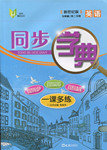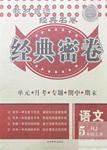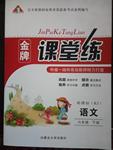题目内容
_____ or not we had a baby, we couldn’t survive only on my salary.
- A.As
- B.Even
- C.However
- D.Whether

 同步学典一课多练系列答案
同步学典一课多练系列答案 经典密卷系列答案
经典密卷系列答案 金牌课堂练系列答案
金牌课堂练系列答案请认真阅读下面短文,并根据所读内容在文章后图表中的空格里填入最恰当的单词。注意:每空不超过1个单词。
Whenever we meet with difficulty or failure, teachers, parents or others often say to us or perhaps we say to ourselves, “Never give up.” These can be encouraging words and words of determination. A person who believes in himself will keep trying to reach his goal no matter how many times he fails. In my opinion, the quality of determination to succeed is an important one to have. Therefore, I believe that we should never give up.
One reason is that if we give up too easily, we will rarely achieve anything. It is not unusual for us to fail in our first attempt at something new, so we should not feel disappointed and should try again. Besides, if we always give up when we fail, we will not be able to develop new skills and grow.
Another reason we should never give up is that we can learn from our mistakes so that we can not make the same ones. If we do not try again, the lesson we have learned is wasted.
Finally, we should never give up because as we work to reach our goals, we develop confidence, and this confidence can help us succeed in other areas of our lives. If we never challenge ourselves, we will begin to doubt our abilities.
In short, it is important that we do not give up when working for our goals. Whether we succeed in the end or not, we will learn something, and what we learn will help us to become better and more confident. Furthermore, if we give up, we have no chance of attaining our goals any more , but if we keep making great efforts, there is always a chance that we will succeed one day.
Topic: Never Give Up
| Possible meanings and the author’s opinions | ? The words “ Never give up” can__【小题1】__ others or oneself and express one’s determination. ? A person who wants to ___【小题2】___ should have the quality. So we should never give up. |
| The ______【小题3】____ | ?If we give up too easily, maybe we will achieve ____【小题4】___, so when we fail in our first attempt at something new, we should not___【小题5】____ ourselves but try again. ?Always giving up means that we will not be able to ___【小题6】____ any progress. ? Never giving up will make us learn from the mistakes we’ve made before and learn the ___【小题7】____ so as not to make the same mistakes. ? To reach our goals and develop the confidence which can help us ___【小题8】____ourselves, we must not give up but challenge ourselves. |
| Conclusions | If you give up, you will have no__【小题9】____of reaching your goals. Never give up and you will attain your goals sooner or ___【小题10】____ |